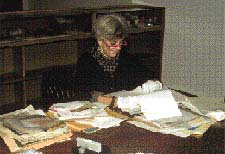
By John Smith
After its opening in May 1994, the Archives of The Andy Warhol Museum quickly took its place among the important research collections within Carnegie Institute. The archives staff responds to nearly 500 research requests each year, a figure we are confident will continue to increase.
The archival collections are an unparalleled resource for scholars and researchers studying Warhol's life and art; however, because Warhol's interests were so wide-ranging and his sphere of influence so far- reaching, the collections have also proven valuable to researchers working in areas such as gender studies, avant-garde film, performance art, and popular music. Recent visitors to the archives reveal the key role the archives are playing in furthering our research into Warhol and his times.
Two of the Archives' most dedicated users are Neil Prinz and Callie Angell. Prinz in collaboration with art historian Georg Frei, is compiling the catalogue raisonné of Warhol's painting, sculpture and drawings. The project is taking place under the auspices of The Andy Warhol Foundation for the Visual Arts and Thomas Amman Fine Art, a Swiss gallery with a long history of involvement with Warhol's works. During his frequent visits to Pittsburgh, Prinz has uncovered countless details about Warhol's work that have proven essential in dating Warhol's paintings, establishing exhibition histories, clarifying questions concerning his working methods and materials, and offering leads to previously undocumented works by the artist.
Angell, who spearheads the Andy Warhol Film Project at the Whitney Museum of American Art in New York, is engaged in cataloguing and preserving the more than 500,000 feet of motion picture film created by Warhol from 1963 through the early 1970s. During a recent week-long research visit in Pittsburgh, Angell discovered a notebook that Warhol had filled with ideas for films he wanted to make.
"The very existence of such a notebook contradicts previous assumptions about Warhol's indifferent approach to filmmaking and confirms other recently discovered evidence of his systematic working methods," Angell notes. Another discovery was a 15-page financial report from the Filmmakers Cooperative for the distribution of the Warhol films. Angell says this document "could not be duplicated in twenty years of independent research. With the discovery of this single document, a major part of the puzzle has been filled in."
Researchers engaged in shorter-term projects also visit frequently. Melissa Ragona, who teaches at State University of New York, Buffalo, visited the Archives to listen to rare taped interviews between Warhol and the German filmmaker Leni Riefenstahl for her upcoming publication, A Genealogy of Spectacle: Fascism, Consumerism, and the Mimetic Body. Warhol interviewed the reclusive Riefenstahl in 1975 for Interview magazine. The archival collection contains more than 3,500 audio tapes, many containing the original material used in Interview.
In the fall of 1996, the Archives were used extensively by a group of University of Pittsburgh graduate students enrolled in a seminar about Warhol. Their professor, Kirk Savage, recognized the importance of the Archives and encouraged his students to make use of the collection. For many, it was their first opportunity to use primary research materials, and while the sheer volume of material sometimes overwhelmed them, they nevertheless were able to produce interesting, challenging work based on their discoveries.
The Archives Study Center, located on the third floor of The Andy Warhol Museum, is open to researchers by appointment only, during regular museum hours. Call 237-8360 to schedule a visit.
John Smith is the archivist at The Andy Warhol Museum.